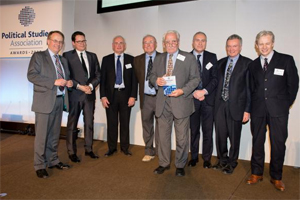
Members of British Election Study research teams receive the award including Professor Sir Ivor Crewe, Professor Paul Whiteley and Professor David Sanders.
The Political Studies Association's prestigious Judges’ Award has been presented to the British Election Study in acknowledgement of its significant contribution to political studies and public debate.
With contributions from some of the foremost political scientists operating in the UK including many academics based at the University of Essex, it stands as the most extensive and longstanding longitudinal study in the political studies field which has given us fundamental insight in to the quality - and failings - of our democracy.
The University of Essex has played a key role in the growth and development of the Study, running it from 1974 to 1983 and then from 2001 to 2010.
The Awards Jury said: “The Judges selected the British Election Study team for its contribution to our understanding of British politics over decades and the development of outstanding data that will benefit generations of researchers to come.”
The Guardian has described the data produced over the years as being “the most trustworthy and comprehensive guide to British life available between hard covers”.
The Political Studies Association annual awards night was held in the heart of Westminster at Church House and was hosted by Michael Crick from Channel 4 News.
Political Studies Association CEO Helena Djurkovic said: “At a time when federal political science research funding in the United States has been restricted by the passing of the Coburn Amendment, it is vital to celebrate political science research that has made a major contribution to our understanding of politics and society. The British Election Study has done this with distinction for almost 50 years.”
Instigated by David Butler and Donald Stokes, the study has been repeated and extended at every General Election since 1964, in the process accumulating over 45 years’ of data and enabling analysts to identify and chart long-term trends among voters.
Its purpose is to study long term trends in voting behaviour and to explain election outcomes, turnout and party choice through the detailed analysis of survey data. It has led to major advances in the understanding of electoral behaviour in the UK and has been replicated in many countries across the world.
Over the past five decades the study, funded by the Economic and Social Research Council, has been based at the University of Oxford, the University of Essex, and now Manchester University.
Professor Sir Ivor Crewe, Bo Säarlvik and Professor Jim Alt ran the study at the University of Essex from 1974-83. The 2001, 2005-06, and 2009-10 British Election Studies were once again undertaken by the University of Essex but with a new team lead by Professor David Sanders and Professor Harold Clarke collaborating with Professor Harold Clarke and Professor Marianne Stewart at the University of Texas.
The team made use of face to face interviews and panel surveys to focus on the key issues of party choice, political participation, campaign dynamics and interelection dynamics of public opinion and party support.
A book length report has been published after each election including The British Electorate 1963-1992 (Crewe et al 1995) and Affluence, Austerity and Electoral Change in Britain (Sanders et al 2013).